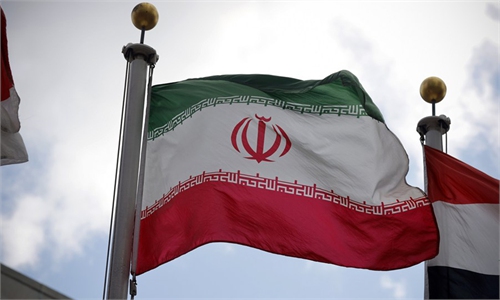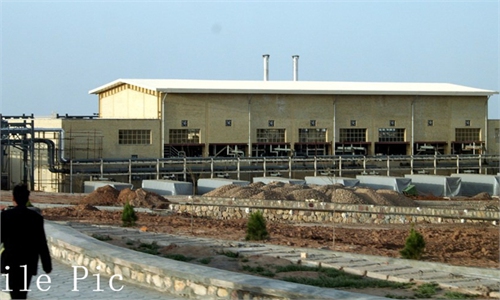Iran's President Hassan Rouhani said on Wednesday its decision to boost uranium enrichment to 60 percent is a response to Israel's "terrorism," days after an attack on its Natanz nuclear facility.
"Enabling IR-6 [centrifuges] at Natanz today, or bringing enrichment to 60 percent: This is the response to your malice," Rouhani said in a message aimed at arch-enemy Israel, in televised remarks.
"What you did was nuclear terrorism. What we do is legal," he said, referring to a blast early Sunday that knocked out electricity at its main nuclear facility in central Iran.
Iran's envoy to the International Atomic Energy Agency, Kazem Gharibabadi, wrote on Twitter that enrichment to higher purity was starting and that "we expect to accumulate the product next week" from centrifuges at Natanz.
Iran's announcement of stepped-up enrichment, made Tuesday, has cast a shadow over talks in Vienna aimed at salvaging the tattered 2015 nuclear deal between Iran and world powers that then US president Donald Trump abandoned three years ago.
The step will bring Iran closer to the 90 percent purity threshold for military use and shorten its potential "breakout time" to build an atomic bomb - a goal the Islamic republic denies.
Under the nuclear deal, Iran had committed to keep enrichment to 3.67 percent, though it stepped this up to 20 percent in January.
Iran said it requires the more highly enriched uranium for medical purposes.
Gharibabadi said in his tweet that the new material "will improve significantly both the quality and quantity of radiopharmaceutical products."
Israel, which did not claim responsibility for the Natanz explosion, has often vowed it will stop Iran from ever building an atomic bomb which it would consider an existential threat to the Jewish state.
Israel is strongly opposed to US President Joe Biden's efforts to revive the nuclear agreement between Iran and the UN Security Council's permanent members plus Germany.
The accord, agreed when Biden was vice president to Barack Obama, promised Tehran relief from punishing sanctions in return for agreeing to limits on its nuclear programme.
The US said Tuesday it stood by Israel but remained committed to the Iran talks despite Tehran's enrichment plan.
"Enabling IR-6 [centrifuges] at Natanz today, or bringing enrichment to 60 percent: This is the response to your malice," Rouhani said in a message aimed at arch-enemy Israel, in televised remarks.
"What you did was nuclear terrorism. What we do is legal," he said, referring to a blast early Sunday that knocked out electricity at its main nuclear facility in central Iran.
Iran's envoy to the International Atomic Energy Agency, Kazem Gharibabadi, wrote on Twitter that enrichment to higher purity was starting and that "we expect to accumulate the product next week" from centrifuges at Natanz.
Iran's announcement of stepped-up enrichment, made Tuesday, has cast a shadow over talks in Vienna aimed at salvaging the tattered 2015 nuclear deal between Iran and world powers that then US president Donald Trump abandoned three years ago.
The step will bring Iran closer to the 90 percent purity threshold for military use and shorten its potential "breakout time" to build an atomic bomb - a goal the Islamic republic denies.
Under the nuclear deal, Iran had committed to keep enrichment to 3.67 percent, though it stepped this up to 20 percent in January.
Iran said it requires the more highly enriched uranium for medical purposes.
Gharibabadi said in his tweet that the new material "will improve significantly both the quality and quantity of radiopharmaceutical products."
Israel, which did not claim responsibility for the Natanz explosion, has often vowed it will stop Iran from ever building an atomic bomb which it would consider an existential threat to the Jewish state.
Israel is strongly opposed to US President Joe Biden's efforts to revive the nuclear agreement between Iran and the UN Security Council's permanent members plus Germany.
The accord, agreed when Biden was vice president to Barack Obama, promised Tehran relief from punishing sanctions in return for agreeing to limits on its nuclear programme.
The US said Tuesday it stood by Israel but remained committed to the Iran talks despite Tehran's enrichment plan.


